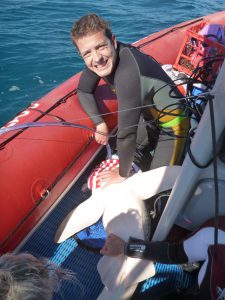Mike holds a BSc in Zoology from Newcastle University and an MSc in Wild Animal Biology from the Institute of Zoology. He is currently undertaking a PhD investigating the environmental drivers influencing the movement networks and social ecology of reef sharks in the British Indian Ocean Territory under Dr Emma Tebbs at King’s College London and Dr David Jacoby at the Institute of Zoology as part of the London NERC DTP.
Mike’s research interests lie in using tagging technologies and remote sensing to investigate movement ecology of marine fauna. From 2010 – 2015, Mike was employed as the research officer for the University of Queensland, investigating the impacts of anthropogenic disturbance of humpback whales. From 2016 to starting his PhD, Mike worked as a freelance field researcher, employed on a number of projects by institutions such as St Andrews University and the World Conservation Society, investigating many aspects of movement ecology in marine fauna, such as humpbacks, dugongs and northern bottlenose whales.
Mike’s PhD project will use extensive acoustic tracking data from grey reef and silvertip sharks over a five-year period from the British Indian Ocean Territory (BIOT), and environmental data from satellite remote sensing to provide insights into how reef shark movement, habitat and social patterns are influenced by environmental change. This is valuable data for policy makers in order to aid management decisions for the conservation of highly mobile marine fauna. He chose King’s for his PhD due to the expertise and experience of his supervisor (Dr Emma Tebbs) in remote sensing and aquatic research.
The key objectives for the project are to:
- Explore the temporal periodicity of reef shark movements in BIOT (temporally recurring motifs in movement networks).
- Define how best to incorporate new, high resolution environmental monitoring data into animal movement networks at an appropriate spatial and temporal scale.
- Model the relationship between environmental drivers and reef shark movement networks in BIOT.
- Develop fine scale remote sensing techniques for reef health in BIOT to detect long and short-term impacts of coral bleaching events.
- Measure the indirect impacts of coral bleaching events on the structural connectivity of the reef shark population using satellite imagery.
Mike’s three Water Words:
Marine
Sharks
Disturbance
